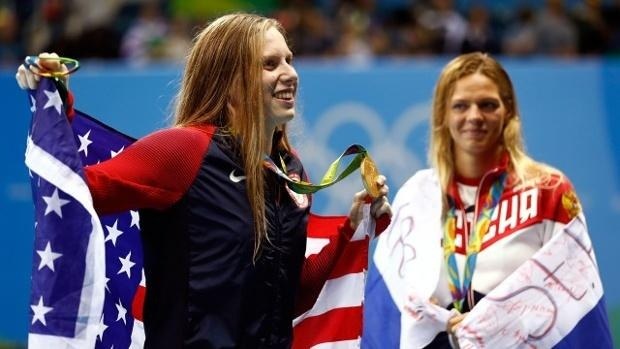Anti-doping crusaders are doing their best to make poor sportsmanship fashionable at the 2016 Summer Olympics in Rio de Janeiro. They are encouraging “clean athletes” to assert their moral superiority over athletes who have previously been sanctioned for doping violations.
The most common tactic utilized by “clean athletes” is to allege that such athletes are actively involved in doping at the Rio Olympics even if the doping violation happened two, four or eight years ago. Anti-doping crusaders don’t think the former dopers are good enough to be at the Olympics no matter how much time has passed since the completion of their doping sanction.
Anti-doping crusaders are celebrating rude, disrespectful and unprofessional behavior in the name of clean sport. It is all justified even if it involves the insulting of other athletes or the refusal to congratulate, interact, address or even acknowledge the other competitors.
The most discussed example of such poor sportsmanship involved American swimmer Lilly King. King displayed open contempt for the rules that allowed athletes like her rival Russian Yulia Efimova to swim in the same race as King.
“You know, you’re shaking your finger No. 1 and you’ve been caught for drug cheating,” King said. “I’m just not, you know, a fan.”
Since Efimova served a 16-month doping suspension after using a dietary supplement containing DHEA as an ingredient in 2013, King didn’t feel she was under any obligation to show Efimova any type of respect and openly insulted her before and after the race. King even gloated about being clean after defeating Efimova in the women’s 100-meter breaststroke.
“It’s incredible, just winning a gold medal and knowing I did it clean,” King bragged after she won.
Some people may want to excuse King’s embarrassing actions to that of an impressionable teenager caught up in the moment. But King didn’t change her tune several days later after having the opportunity to reflect on the events that transpired. She remained unapologetic.
“I’m glad I did it. It was something that needed to be brought up, in my mind. I wasn’t even planning on speaking out. It just kind of happened. But I’m glad I did, because it is something that needs to be noticed, and it’s something that needs to be dealt with, and I just happened to be the person that decided to come out, so I’m super glad I did it.”
The poor sportsmanship was by no means limited to King or Olympic athletes from the United States. In fact, King reported being inspired by Australian swimmer Mack Horton. Horton similarly insulted his top rival from China – Sun Yang. Yang was suspended for 3 months after testing positive for the anti-angina drug trimetazidine in 2014.
“I used the word ‘drug cheat’ because he tested positive,’’ Horton said after he defeated Yang and won the gold medal in the 400-meter freestyle. “I just have a problem with him testing positive and still competing.”
And like King, Horton refused to apologize. Horton cited the media’s reaction to King’s comments as justification for his own disrespectful comments.
“I do not think I need to apologize… I just said what is true,” Horton told Reuters. “I think people need to be more comfortable talking about doping in sport.
“I guess it worked because Lilly King was obviously more comfortable talking about it and so were other athletes.”
Not to be outdone by the Americans or the Australians, French swimmer Camille Lacourt also joined in to insult people like Efimova and Yang who “disgust” her.
“They don’t belong in a sport,” Lacourt said. “They should make up their federation of dopers and have fun among themselves. It disgusts me to see people who’ve cheated standing on podiums. Sun Yang, in the 200 free, he pees purple.”
It’s bad enough when gold medalists stand on a podium claiming they are (morally) superior to athletes they have defeated. It may be even worse when athletes who lose the race choose to diminish and belittle the accomplishments of those who performed better than they did.
Swedish distance runner Sarah Lahti finished twelfth in the women’s 10,000 meter final. Lahti ran the race faster than she had ever done in her entire career. Yet, she wasn’t happy with her own achievement. She could only focus on the winner Ethiopian Almaz Ayana and Ayana’s world record time.
Ayana destroyed the world record by 14 seconds with an amazing time of 29:17.45. Lahti wasn’t impressed. She wasn’t amazed. She didn’t wish to congratulate or praise Ayana’s performance. Instead, Lahti did everything she could to delegitimize the performance. In spite of the fact that there was no evidence whatsoever that Ayana used banned performance-enhancing drugs (PEDs), Lahti had no doubt that Ayana was using drugs.
“I do not really believe that she is 100 percent,” Lahti said. “It is too easy for her. I cannot say that she is not clean, but there is little doubt.”
These examples of poor sportsmanship are appalling. It is clear that the anti-doping crusaders have no interest in fairness to all athletes who qualified under the IOC and WADA rules. They are only interested in promoting moral panic and expressing their superiority over as many athletes as they can throw under a cloud of doping suspicion.
It is probably not surprising that the aforementioned “clean athletes” come from the four countries – United States, Australia, Sweden and France – with some of the most draconian anti-steroid laws and accompanying steroid hysteria in the world.
Such disrespectful and poor sportsmanship may be seen acceptable to many people in those countries but it remains appalling to the rest of the world.

